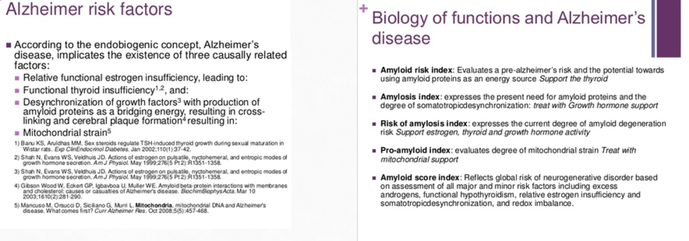
Alzheimers Disease from an endobiogenic perspective:
AIzheimers disease is a disorder of energy metabolism. It occurs when there is a sudden drop in estrogen activity, with insufficient compensatory peripheral thyroid activity, and a somatotropic desychronization. Amyloid proteins are used as a bridging energy due to mitochondrial strain, but eventually, they cross link, cause the plaques that you see, and further reduce glucose availability within the brain.
Jean Claude Lapraz MD & Kamyar Hedayat MD, Introd. to BoF, May 2013; slides 41-44)
Dementia is a metabolic problem that involves the whole body-mind system with complex hormonal feedback loops.
Treatment requires a whole system approach that treats the individual person rather than the disease.
Endobiogenics is such a whole system approach which is based on the understanding of complex hormonal feedback loops.
Plant remedies, diet and life style changes are used to balance the neuro-endocrine system. Endobiogenic practitioners have identified common patterns of imbalance in neuro-endocrine function in the biology of function results in patients suffering from Alzheimers disease. Such common patterns may include what is described in the above 2 slides: Relative functional estrogen deficiency; functional thyroid insufficiency; desynchronization of growth factors; mitchochondrial strain.
AIzheimers disease is a disorder of energy metabolism. It occurs when there is a sudden drop in estrogen activity, with insufficient compensatory peripheral thyroid activity, and a somatotropic desychronization. Amyloid proteins are used as a bridging energy due to mitochondrial strain, but eventually, they cross link, cause the plaques that you see, and further reduce glucose availability within the brain.
Jean Claude Lapraz MD & Kamyar Hedayat MD, Introd. to BoF, May 2013; slides 41-44)
Dementia is a metabolic problem that involves the whole body-mind system with complex hormonal feedback loops.
Treatment requires a whole system approach that treats the individual person rather than the disease.
Endobiogenics is such a whole system approach which is based on the understanding of complex hormonal feedback loops.
Plant remedies, diet and life style changes are used to balance the neuro-endocrine system. Endobiogenic practitioners have identified common patterns of imbalance in neuro-endocrine function in the biology of function results in patients suffering from Alzheimers disease. Such common patterns may include what is described in the above 2 slides: Relative functional estrogen deficiency; functional thyroid insufficiency; desynchronization of growth factors; mitchochondrial strain.
